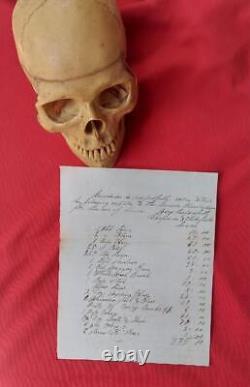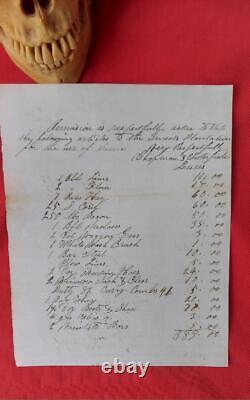Smeads Plantation Vicksburg, Warren County MS Plantation Supply Request Civil War




Smeads Plantation Vicksburg, Warren County MS Plantation Supply Request Civil War. 1865 Plantation Supply Permission Request for the. The Smeads Plantation was once located in Warren County, Mississippi. Susan Dabney Smedes, whose book.
Memorials of a Southern Planter. Offered a romantic depiction of the antebellum South, was born in Raymond, Mississippi, on 10 August 1840, the eighth child of Thomas Smith Gregory Dabney, a planter, and Sophia Hill Dabney. She spent her childhood at Burleigh, the family's four-thousand-acre cotton plantation located ten miles from Raymond. Smedes was educated through a combination of home tutoring and attendance at academies in New Orleans.
During the Civil War the family moved to Alabama and later Georgia, returning to Mississippi only after Union general George Stoneman and his troops occupied Macon in July 1864. While Burleigh survived the ravages of war, the family's finances did not. Once a prosperous planter with more than five hundred slaves, Thomas Dabney now found himself in debt.
To alleviate the family's financial troubles, Smedes established the Bishop Green Training School at Oak Grove. After Thomas Dabney's death in 1885, Smedes wrote. (1887), a testimony to her father as a benevolent slaveholder.The book, comprised of Smedes's reminiscences and edited family correspondence, romanticized slavery and plantation life in the antebellum South. Describing Dabney as the kind "ruler" of his large "kingdom, " Smedes constructed an idealized portrait of contented, "over-indulged" slaves such as "Mammy Harriet" to affirm the "civilizing" effects of bondage and the honor and gentility of the slaveholding South. The book also addressed the effects of war and defeat on the plantation system. It enjoyed widespread success in the South, with many regarding it as a literary refutation of the immoral and corrupt slaveholders depicted in Harriet Beecher Stowe's. Seven editions of the book were published before the turn of the twentieth century.
British prime minister William E. Gladstone read the book with "lively interest" and arranged for its publication in London under the title. Smedes enjoyed her literary success and balanced her writing endeavors with her work as a missionary. In 1887 she became a teacher at the Big Oak School of the Rosebud Agency in the Dakota Territory, remaining there until ill health forced her to resign fourteen months later. She completed a three-year term as a clerk in the surveyor general's office in Montana before moving to Washington, D.
In 1891, and obtaining a clerkship in the Bureau of Pensions. After traveling throughout England and Europe, she made her home in Sewanee, Tennessee, where she died on 4 July 1913. Get Supersized Images & Free Image Hosting. Create your brand with Auctiva's.Attention Sellers - Get Templates Image Hosting, Scheduling at Auctiva.

